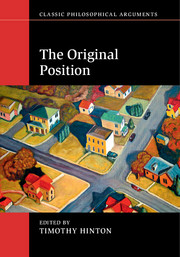Book contents
- Frontmatter
- Contents
- List of contributors
- Acknowledgments
- List of abbreviations
- Introduction: the original position and The Original Position – an overview
- 1 Justice as fairness, utilitarianism, and mixed conceptions
- 2 Rational choice and the original position: the (many) models of Rawls and Harsanyi
- 3 The strains of commitment
- 4 Our talents, our histories, ourselves: Nozick on the original position argument
- 5 Rawls and Dworkin on hypothetical reasoning
- 6 Feminist receptions of the original position
- 7 G. A. Cohen's critique of the original position
- 8 Liberals, radicals, and the original position
- 9 The original position and Scanlon's contractualism
- 10 The “Kantian roots” of the original position
- 11 Stability and the original position from Theory to Political Liberalism
- 12 The original position in The Law of Peoples
- References
- Index
2 - Rational choice and the original position: the (many) models of Rawls and Harsanyi
Published online by Cambridge University Press: 05 December 2015
- Frontmatter
- Contents
- List of contributors
- Acknowledgments
- List of abbreviations
- Introduction: the original position and The Original Position – an overview
- 1 Justice as fairness, utilitarianism, and mixed conceptions
- 2 Rational choice and the original position: the (many) models of Rawls and Harsanyi
- 3 The strains of commitment
- 4 Our talents, our histories, ourselves: Nozick on the original position argument
- 5 Rawls and Dworkin on hypothetical reasoning
- 6 Feminist receptions of the original position
- 7 G. A. Cohen's critique of the original position
- 8 Liberals, radicals, and the original position
- 9 The original position and Scanlon's contractualism
- 10 The “Kantian roots” of the original position
- 11 Stability and the original position from Theory to Political Liberalism
- 12 The original position in The Law of Peoples
- References
- Index
Summary
The original position and rational justification
The Fundamental Derivation Thesis
At the outset of TJ Rawls closely links the theory of justice to the theory of rational choice:
one conception of justice is more reasonable than another, or justifiable with respect to it, if rational persons in the initial situation would choose its principles over those of the other for the role of justice. Conceptions of justice are to be ranked by the acceptability to persons so circumstanced. Understood in this way the question of justification is settled by working out a problem of deliberation: we have to ascertain which principles it would be rational to adopt given the contractual situation. This connects the theory of justice with the theory of rational choice.
(TJR, p. 16)Indeed, Rawls proclaims that “the theory of justice is part, perhaps the most significant part, of the theory of rational choice” (TJR, p. 15, emphasis added; see section 2.2.3 below). Many have refused to take this claim literally (or even seriously), by, for example, interpreting the original position analysis as a heuristic for identifying independently true moral principles (see Dworkin, “Original Position,” p. 19 and Barry, Theories, pp. 271–82). In this chapter we take this fundamental claim of Rawls at face value. We thus shall defend:
The Fundamental Derivation Thesis: the justification of a principle of justice J derives from the conclusion that, under conditions C, J is the rational choice of chooser(s) P.
On the Fundamental Derivation Thesis that J is the rational choice of P under C is neither evidence that J is the correct principle nor a way of us appreciating or seeing that J is just. Rather J's justification is derivative of J's status as P's rational choice; moral justification derives from justification qua rational choice. Notice that we do not say that J's justification is entirely derivative of rational choice justification, for the set of the conditions C under which the choice is made (including those that identify the feasible choice set) also has justificatory relevance.
The Fundamental Derivation Thesis also sets aside the interpretation of the original position as fundamentally justifying through appeal to hypothetical consent. Consent is not, strictly speaking, ever a concern for Rawls or for any original position theorist.
- Type
- Chapter
- Information
- The Original Position , pp. 39 - 58Publisher: Cambridge University PressPrint publication year: 2015
- 17
- Cited by

